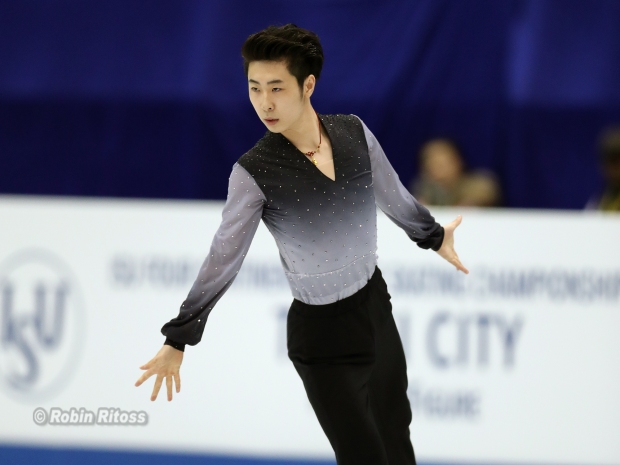While many of leading skaters chose to skip this year’s Four Continents Figure Skating Championships so close to the PyeongChang Olympic Games next month, there was plenty of high level skating in Taipei City which hosted the 20th edition of the event.

Boyang Jin became the first man since Chengjiang Li in 2001 to win a Four Continents title. The two-time World bronze medallist broke 100 points for the first time in the short programme with a personal best score of 100.17. In second place going into the free skating, he executed a near perfect routine to win gold. He had qualified for this season’s Grand Prix Final, but had to withdraw due to injury.
“Fans are my motivation,” Jin said. “Taiwan is kind of like my lucky place. After the injury, I have put a lot of efforts (into practices and recovery) I will seize every chance (to compete) and not to get injured.”
Shoma Uno had been sitting in first place following the short, but a fall on a quadruple flip in the free proved costly and he dropped down to second place. Jason Brown moved up from fourth after the short to win the bronze medal. It was the first Four Continents hardware for the American.

Japanese women dominated their event. Kaori Sakamoto built on her performances at Japanese Nationals to win gold in her first Four Continents appearance. She posted personal bests in both the short (71.34) and free (142.87). Sakamoto had previously picked up a bronze medal in the same arena at last year’s World Junior Figure Skating Championships.
” I have skated here before at Junior Worlds last year and I did a clean short and long program,” she said. “So I have a good memory here at the rink. That made me feel confident and I was able to skate comfortably.”
The defending champion Mai Mihara finished second this time round with two solid routines. 2016 Four Continents gold medallist Satoko Miyahara had been in the lead after the short, but a fall on a triple Salchow and a number of under rotations in her free meant she sunk to third place. This was the third time that Japanese women had swept the podium at Four Continents.

For the first time at Four Continents, American pairs occupied the top two spots on the podium. Tarah Kayne and Danny O’Shea took silver at Four Continents four years ago in 2014 and this time upgraded to claim their first title at the event. It was also the first Four Continents title for an American pair since Rena Inoue and John Baldwin captured gold in 2006. They also hit new personal bests in both the short (65.74) and the free (128.68).
“Next season we will definitely work on a higher technical mark and we are going to start immediately trying other technical things and hopefully next year we can continue this hard work to get higher scores,” Kayne said.
Ashley Cain and Timothy Le Duc had been in the lead after the short where they recorded a new personal best score of 66.76. The Americans also had a career best skate in the free with a score of 123.85 to wind up in second place.
History was made by North Korea’s Tae Ok Ryom and Ju Sik Kim as they became the first skaters from their country to medal at Four Continents with their bronze medal.

Kaitlin Hawayek and Jean-Luc Baker from the United States of America romped to the ice dance title by a wide margin. Carolane Soucisse and Shane Firus of Canada pipped Japan’s Kana Muramoto and Chris Reed to the silver medal. The Japanese were the first ice dancers from outside the U.S. and Canada to medal at Four Continents.
Full results of the 2018 Four Continents Figure Skating Championships are available here.
